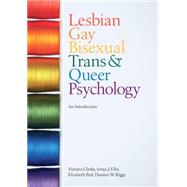
Note: Supplemental materials are not guaranteed with Rental or Used book purchases.
Purchase Benefits
What is included with this book?
| List of boxes | p. viii |
| Introduction: how to read and use this book | p. xi |
| What's in this book? | p. xi |
| Pedagogical features of the book | p. xiii |
| Our approach | p. xvi |
| Who we are | p. xvii |
| Acknowledgements | p. xviii |
| History, contexts and debates in LGBTQ psychology | p. 1 |
| Introducing LGBTQ psychology | p. 3 |
| What is LGBTQ psychology and why study it? | p. 3 |
| The scientific study of sexuality and 'gender ambiguity' | p. 6 |
| The historical emergence of 'gay affirmative' psychology | p. 12 |
| Struggling for professional recognition and challenging heteronormativity in psychology | p. 18 |
| Key debates and perspectives | p. 25 |
| Social constructionism versus essentialism | p. 26 |
| Liberalism versus radicalism | p. 35 |
| The relationship between LGBTQ psychology and feminism | p. 38 |
| The relationship between LGBTQ psychology and queer theory | p. 40 |
| The relationship between LGBTQ psychology and critical psychology | p. 44 |
| The relationship between LGBTQ psychology and positive social change | p. 47 |
| Doing LGBTQ psychological research | p. 52 |
| Research methods and approaches | p. 52 |
| Issues in doing LGBTQ psychological research | p. 64 |
| Understanding social marginalisation in LGBTQ lives | p. 79 |
| Diversity | p. 81 |
| Understanding diversity in LGBTQ communities | p. 81 |
| Gender | p. 83 |
| Bisexuality | p. 86 |
| Trans and queer | p. 88 |
| Social class | p. 90 |
| Race | p. 92 |
| Organised religion and spirituality | p. 94 |
| Rural life | p. 97 |
| Ability | p. 98 |
| Prejudice and discrimination | p. 103 |
| Sexuality and gender identity prejudice in context | p. 103 |
| Sexuality and gender identity prejudice as anti-LGBTQ attitudes and behaviours | p. 104 |
| Sexuality and gender identity prejudice as social marginalisation | p. 116 |
| Health | p. 125 |
| What is LGBTQ health? | p. 125 |
| Sexual health | p. 128 |
| Mental health | p. 134 |
| Physical health | p. 140 |
| LGBTQ experiences across the lifespan | p. 149 |
| Young people, coming out and identity development | p. 151 |
| Young people, sexuality and gender identity | p. 151 |
| Models of LGBTQ identity development | p. 153 |
| Sexual fluidity | p. 159 |
| Disclosure to family and friends | p. 162 |
| LGBTQ young people in school | p. 165 |
| Exploring identity and finding a community | p. 169 |
| Relationships | p. 173 |
| Legal recognition of same-sex relationships | p. 173 |
| Comparing same-sex and different-sex relationships | p. 177 |
| Sexual practices | p. 181 |
| Beyond the normative couple | p. 185 |
| Parenting and family | p. 194 |
| Paths to parenthood for LGBTQ people | p. 194 |
| Comparing lesbian-, gay- and trans-headed families with heterosexual-headed families | p. 199 |
| Moving away from a 'proving otherwise' agenda | p. 207 |
| Looking inside LGBTQ families | p. 211 |
| Ageing and old age | p. 216 |
| Age, ageing and ageism in LGBTQ communities | p. 216 |
| Styles of ageing | p. 225 |
| Issues in health and social care in old age | p. 227 |
| Bereavement and death | p. 230 |
| Conclusion | p. 239 |
| The future of LGBTQ psychology | p. 241 |
| Beyond the 'usual suspects' | p. 241 |
| Intersectionality and privilege | p. 245 |
| Applications of LGBTQ psychology | p. 248 |
| Future directions | p. 253 |
| Glossary | p. 257 |
| Additional resources | p. 272 |
| References | p. 278 |
| Index | p. 321 |
| Table of Contents provided by Ingram. All Rights Reserved. |
The New copy of this book will include any supplemental materials advertised. Please check the title of the book to determine if it should include any access cards, study guides, lab manuals, CDs, etc.
The Used, Rental and eBook copies of this book are not guaranteed to include any supplemental materials. Typically, only the book itself is included. This is true even if the title states it includes any access cards, study guides, lab manuals, CDs, etc.